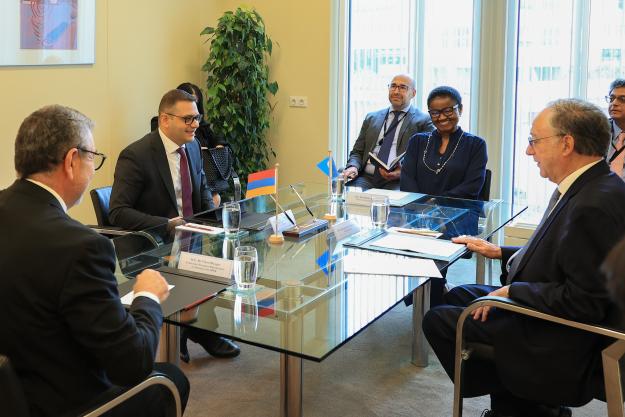
Mr. Robert Abisoghomonyan, Deputy Minister of Foreign Affairs of Republic of Armenia, and Ambassador Fernando Arias, OPCW Director-General, and their delegations during a visit to OPCW Headquarters.
THE HAGUE, Netherlands—30 July 2025—The Director-General of the Organisation for the Prohibition of Chemical Weapons (OPCW), Ambassador Fernando Arias, met with Armenia’s Deputy Minister of Foreign Affairs, H.E. Mr Robert Abisoghomonyan, on 16 July 2025 at the OPCW’s Headquarters in The Hague.
During the meeting, Director-General Arias briefed Deputy Minister Abisoghomonyan on key challenges related to the implementation of the Chemical Weapons Convention (CWC), particularly in the context of the deteriorating global security environment. He shared updates on OPCW’s efforts to assist Syria in achieving complete elimination of its chemical weapons programme and meet all its obligations under the CWC. Director-General Arias also briefed Deputy Minister Abisoghomonyan on the Organisation’s ongoing work in Ukraine.
The two officials also exchanged views on the importance of reinforcing international cooperation in the face of emerging threats. Director-General Arias welcomed Armenia’s active engagement in regional and global chemical non-proliferation efforts, and underscored the critical role of capacity building, technical assistance, and legislative implementation in strengthening the Convention’s global reach. He highlighted the Organisation’s ongoing efforts to provide training, promote knowledge sharing, and ensure that all States Parties can meet their obligations under the Convention.
The discussion further addressed the impact of rapid advances in science and technology, including the growing use of Artificial Intelligence (AI), on the future of chemical disarmament. Director-General Arias briefed the Deputy Minister on the outcomes of the recent OPCW workshop on chemical safety and security management held in June in Shanghai, China, which brought together experts to examine the safe, ethical, and peaceful use of AI technologies in chemistry. Both parties agreed that increased scientific vigilance and international dialogue are essential to ensure that technological developments are used to strengthen, not undermine, the global chemical weapons prohibition regime.
“Armenia reaffirms its resolute commitment to the Chemical Weapons Convention, which has also been successfully showcased through maintaining a record of full compliance with its obligations. The integrity and credibility of the Convention rely on diligent compliance and constructive engagement by all States Parties,” Deputy Foreign Minister Abisoghomonyan said.
“Armenia firmly believes that the disagreements arising from the implementation of the Chemical Weapons Convention can be overcome through dialogue and cooperative endeavours,” he added.
Director-General Arias concluded the meeting by nothing: “In this volatile international climate, it is more important than ever for States Parties to be extra diligent in ensuring full compliance with their obligations under the Chemical Weapons Convention. Enhancing cooperation across regions and institutions is essential to advancing the Convention’s implementation. The integrity of the global chemical disarmament regime depends on our shared commitment, mutual transparency, and sustained action.”
Background
Armenia signed the Chemical Weapons Convention in 1993, ratifying it in 1995 and has been an active member since the entry of the Convention into force.
As the implementing body for the Chemical Weapons Convention, the OPCW, with its 193 Member States, oversees the global endeavour to permanently eliminate chemical weapons. Since the Convention’s entry into force in 1997, it is the most successful disarmament treaty eliminating an entire class of weapons of mass destruction.
In 2023, the OPCW verified that all chemical weapons stockpiles declared by the 193 States Parties to the Chemical Weapons Convention since 1997 — totalling 72,304 metric tonnes of chemical agents — have been irreversibly destroyed under the OPCW’s strict verification regime.
For its extensive efforts in eliminating chemical weapons, the OPCW received the 2013 Nobel Peace Prize.
